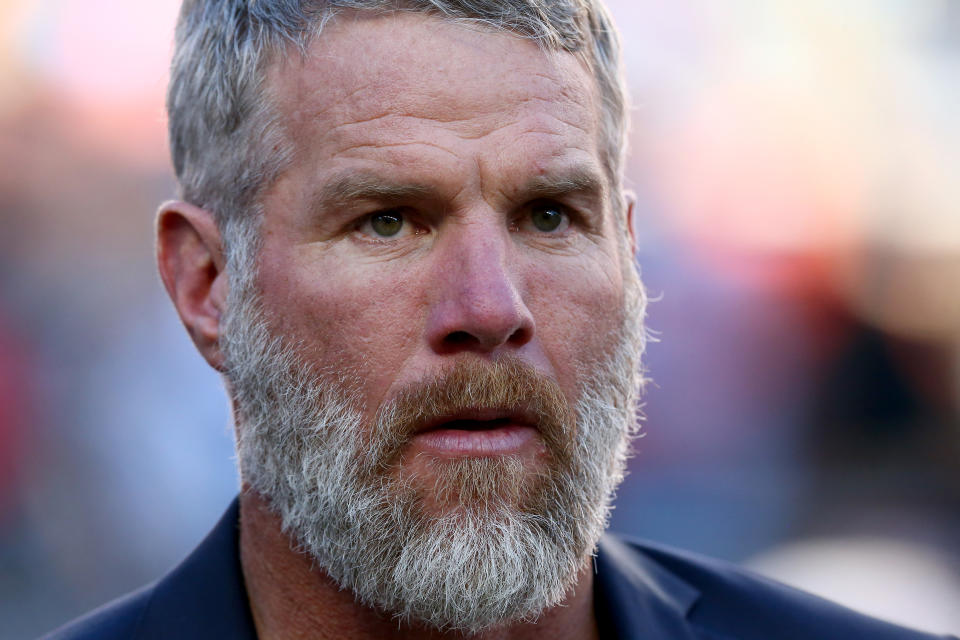Brett Favre's million-dollar Mississippi drama leaves us with more questions than answers
This week’s Brett Favre story is strange. Not strange in an Earl-and-Nina-Thomas-Airbnb-Snapchat sort of way, but what we know to this point doesn’t look great for the quarterback.
Favre was back in the news this week after an audit of Mississippi Department of Human Services documents showed that the Hall of Fame quarterback’s company had received $1.1 million. The money came from the Mississippi Community Education Center (MCEC), a nonprofit that had state DHS permission to disburse Federal Temporary Assistance for Needy Families (TANF) money to needy individuals and families.
The million-plus that went to Favre Enterprises is a fraction of the $94 million that was allegedly improperly spent.
Let’s be clear from the outset: the people who could have benefitted the most from that money are the biggest losers in all of this. Based on 2018 data from the U.S. Census Bureau, Mississippi is the poorest state in the country, with a median household income of $42,781, significantly less than the $63,179 median American household income. Nearly 20 percent of the state’s residents live in poverty.
How did Brett Favre ‘appearances’ benefit the needy?
The audit shows that MCEC paid Favre Enterprises $500,000 in December 2017 and $600,000 in June 2018 for “appearances,” including promotions, autographs and speaking engagements.
Which brings up the first and most basic question: What the heck would a speaking engagement from Brett Favre do for someone battling poverty?
According to the Federal Department of Health and Human Services, the purpose of the TANF program is to “help needy families achieve self-sufficiency.”
The fleeting excitement of meeting arguably the state’s most famous resident doesn’t help pay the light bill or supply nutrition for food-insecure families. Maybe a sold autograph could bring in a little bit of money?
For $1.1 million in federal funds earmarked to help impoverished Mississippians, Favre did ... nothing. At least according to State Auditor Shad White’s office, which told the Mississippi Clarion-Ledger that “the individual contracted did not speak nor was he present for those events.”

Favre repaying $1.1M, tweets his defense
On Wednesday, White’s office said it had received $500,000 from Favre, who wants to repay the money. He’ll pay back the rest in installments, and White said the money will be routed to the DHS for TANF programs.
Later that evening, Favre took to Twitter and said he “never received monies for obligations I didn’t meet,” and that he’d done “numerous ads” for Families First, which is another name for the MCEC. He wrote he is returning the money he was paid because the funds weren’t intended for that purpose.
1/4 My agent is often approached by different products and brands for me to appear in one way or another. This request was no different, and I did numerous ads for Families First.
— Brett Favre (@BrettFavre) May 7, 2020
2/4 I have never received monies for obligations I didn’t meet. To reiterate Auditors White’s statement, I was unaware that the money being dispersed was paid for out of funds not intended for that purpose, and because of that I am refunding the full amount back to Mississippi.
— Brett Favre (@BrettFavre) May 7, 2020
3/4 I have spent my entire career helping children through Favre 4 Hope donating nearly $10 million to underserved and underprivileged children in Mississippi and Wisconsin.
— Brett Favre (@BrettFavre) May 7, 2020
4/4 It has brought a ton of joy to my life, and I would certainly never do anything to take away from the children I have fought to help! I love Mississippi and I would never knowingly do anything to take away from those that need it most.
— Brett Favre (@BrettFavre) May 7, 2020
Is this wordplay by Favre?
He says he did ads for Families First, but the language the state provided says he was contracted for appearances, and autographs and speaking engagements are in-person appearances.
And if he felt he did what he was supposed to do for the organization, why return the money? If it finally goes to those it was intended to help, at least it will be put to better use.
Favre’s past MCEC ties raise more concern
The sparse website for MCEC makes no mention of Favre, and multiple Google searches don’t turn up any ads Favre did for the organization.
A little more digging, however, does find a connection between Favre, the Department of Human Services, and MCEC and this one raises questions as well. In March, the digital news service Mississippi Today published a story that said in January 2019 the DHS met with Favre at the request of then-Gov. Phil Bryant; Favre was hoping to get pharmaceutical company Prevacus, which researches and develops concussion treatments and of which Favre is an investor and spokesman, to locate and manufacture its drug in his home state.
Wanting to bring economic development to Mississippi isn’t wrong, but typically the Mississippi Development Authority would handle such situations. Mississippi Today couldn’t find a clear reason why DHS took the meeting with Favre.
Prevacus didn’t move from Florida to Mississippi, but DHS director John Davis, state contractor Nancy New and her son Zach New allegedly skimmed over $2 million from those DHS funds to make personal investments in Prevacus and an affiliate company.
Around the same time, Favre was also looking for financial support for a volleyball center at his alma mater, the University of Southern Mississippi. The majority of the money for that facility came from the MCEC, which Nancy New owned and ran.
Nancy New was one of six people arrested in February in connection with the alleged embezzlement scheme — she and Zach New are accused of stealing at least $4 million earmarked for Mississippi’s needy.
Yes, it’s all as shady as it seems, and Favre saying he’ll pay back his share probably isn’t the end of this story.
More from Yahoo Sports:


